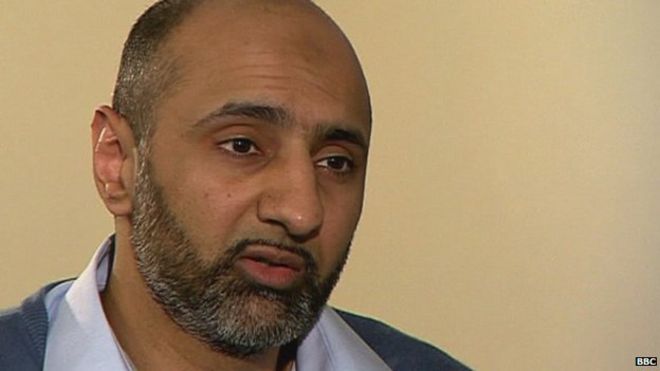
A British man jailed in the US over a website considered to be a key moment in the birth of the internet jihad has returned home.
Babar Ahmad left prison last month and is now back in London with family.
He fought a record eight-year-long campaign against extradition for offences committed in the UK.
British authorities never charged him - but he later pleaded guilty in the US to providing material support to terrorism through his site.
His July 2014 sentence of just over 12 years took into account his time spent in jail in the UK prior to extradition. US prosecutors had sought a far longer term, but the sentencing judge said she could not ignore glowing references in Ahmad's favour, including one written by an influential former CIA officer.
In a statement released via his campaign website, Mr Ahmad, 41, said it had been a "great joy" to be with his family for the Muslim festival of Eid, which comes at the end of the fasting month of Ramadan.
"Eleven years of solitary confinement and isolation in ten different prisons has been an experience too profound to sum up in a few words here and now," he said.
"In October 2012, I was blindfolded, shackled and forcibly stripped naked when I was extradited to the US. Last week, US and UK government officials treated me with courtesy and respect during my journey home."
"In time, I look forward to sharing reflections on my experience to help inform others. I recognise that the world has moved on since 2004, yet in some ways, sadly it has failed to progress. "
"For now, I intend to reconnect privately with my incredible family, to whom I owe so much."

Babar Ahmad Timeline
- 1996-97: Launch and development of Azzam Publications website following Babar Ahmad's experiences in Bosnia
- 2000: Site hosted on US servers, making its contents subject to its law
- 2003: Arrested in London and later receives damages for assault
- 2004: Arrested again on a US extradition warrant
- 2007: European Court of Human Rights halts extradition pending appeal
- Jan 2012: BBC wins legal challenge against ministers blocking attempts to interview Babar Ahmad in prison
- Oct 2012: Ahmad extradited and later pleads guilty
- July 2014: Jailed for 12 and a half years, taking into account time served in UK

Ahmad's case has been one of the most complicated and controversial terrorism investigations since 9/11 and even involved an unprecedented legal battle between the government and BBC News over interviewing him.
Babar Ahmad, like others from the UK, enlisted in the Bosnian Army 20 years ago to help defend Muslim communities from genocide at the hands of Serbian forces during the collapse of Yugoslavia.
In July 1996, he began distributing audio cassettes which told the stories of dead Muslim fighters, whom he hailed as martyrs, and the wider pro-jihad jihadist Azzam Publications website then followed. Some of its later content promoted support for the Taliban in Afghanistan.
Ahmad was a hugely influential figure among some young British Muslims who were debating their place in the world in the aftermath of 9/11. At one point, MI5 placed an informant inside his circle to gather intelligence on his views and contacts. That information never led to any criminal charges in the UK - but he was arrested pending extradition to the US in August 2004.
His campaign against extradition was backed by tens of thousands of ordinary Muslims who believed he was being victimised - but security chiefs in London and Washington blame him - and others who were never arrested or charged - for pioneering online jihadist propaganda techniques still in use today.
The US judge who sentenced Ahmad in July 2014 said she was convinced he was not a supporter of al-Qaeda or someone who had plotted to harm people in a terrorist attack.
Judge Janet Hall said he had shown genuine remorse for setting up websites that promoted jihad and supported the Afghan Taliban, but she added: "You can't walk away from the fact that what you were doing was enabling bin Laden to be protected in Afghanistan."
No comments:
Post a Comment